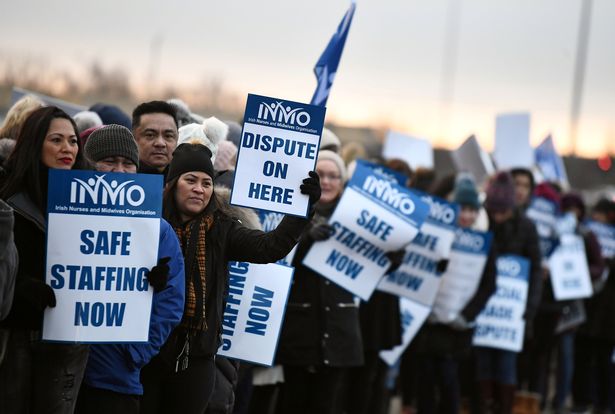On Wednesday, more than 35,000 nurses in Ireland went on strike in what is the second major nursing strike in the history of the country. Their demands include fair wages and recruitment of more staff. The strike was called by the Irish Nurses and Midwives Organization (INMO). The striking INMO members withdrew from work for 24 hours, providing only lifesaving care and emergency services. The nurses decided to strike after the talks between the INMO and government officials failed and the Labour Court chose not to intervene. Nursing unions are demanding equal wages, at par with health service grades like physiotherapists, whom they trail by around €7,000 (USD 8,046) a year.
The strike was fully supported by the union’s 40,000 members at 120 locations across Ireland. The nurses have been overwhelmed by the public support at the picket lines. According to reports, there was a massive turnout at the picket lines at various hospitals across the country, including Connolly Hospital, Crumlin Hospital, Rotunda Hospital Temple Street Hospital, Holles Street Maternity Hospital, St. James Hospital, Coombe Womens Hospital (Dublin), Louth County Hospital in Dundalk, University Hospital at Limerick, Sligo and Galway, Wexford General Hospital, Mullingar Hospital, Letterkenny University Hospital, SIVUH Cork, Tullamore, St Columcille’s, hospitals in Kerry, Manorhamilton, Cork and Blanchardstown, Manorhamilton Hospital at Leitrim, etc.
Midwives at the pickets of Wexford General Hospital held up humorous placards with slogans such as, “We are having a midwife crisis”, “Push! Leo Push!”, “Make womb in your budget”, etc. Meanwhile, a group of nurses at Louth County Hospital in Dundalk came up with their own protest song to the tune of Wagon Wheel.
Irish Mirror reported prime minister Leo Varadkar’s response to questions in the Dail (lower house of the Irish legislature) regarding the nursing strike. He said he could justify borrowing money to save jobs in case of emergency situations, but he stressed that he could not borrow cash to fund pay rises for nurses. This statement evoked criticism from parliament members.
Irish nurses who work in Australia and England also expressed solidarity with the nurses’ strike in Ireland.
The Communist Party of Ireland (CPI) also expressed its solidarity with the striking nurses. Jimmy Doran, secretary of the Dublin District Committee of CPI, told Peoples Dispatch that the nurses did not want to go on strike but were forced to do so as the government refused to engage. The massive support of the people for the nurses shows a total lack of connection between the extreme right-wing Fine Gael government and the citizens, he noted.
“There is a crisis in recruitment and retention of nurses in Ireland due to the low levels of pay offered to them. There are 1,654 nurses less than there were in 2007 despite the population increasing at a rapid rate. The safety levels at hospitals are now at breaking point and people are dying because of the lack of funding for the health service. Despite this, the minister for health, Simon Harris, has refused to engage with the Irish Nurses and the INMO. The government needs to face the reality of this crisis in the health service and get into meaningful negotiations with INMO before more lives are lost due to totally inadequate funding of the Health Service,” Doran said.
“At the same time, there has been an overrun on the building cost of the new children’s hospital. It has gone from an estimate of 650 million euros to 1.7 billion euros. The same minister, Simon Harris, does not mind filling the pockets of the builders of this hospital, which has now become the most expensive children’s hospital on the planet. There is an unending supply of money for big [business] but nothing for the workers,” he added.
Political groups, including Sienne Fienne, Labour Party, Independents 4 Change and Social Democrats, as well as various trade unions and youth organizations expressed solidarity with the strike. INMO also called for similar strikes on February 5 and 7, and then on 12, 13 and 14, if their demands are not met. The Psychiatric Nurses Association (PNA) of Ireland also started their overtime boycott on January 31, which will continue on February 1, 5, 6 and 7, finally leading to strike action on February 12, 13 and 14.





